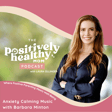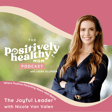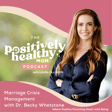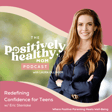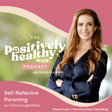
Teen Digital Drama
Welcome to another episode of The Positively Healthy Mom Podcast! In this episode, we are joined by the wonderful Jessica Speer, an expert in helping kids navigate friendships and digital spaces. Jessica is the author of several insightful books, including her latest on cell phones and social media. This episode is a treasure trove of advice and strategies for parents dealing with the complexities of teen digital drama.
We kick off the conversation by discussing the importance of self-awareness in friendships. Jessica emphasizes the value of looking inward and understanding our own behaviors and contributions to any issues that arise. She shares practical advice on using "I" statements to help kids express their feelings and set boundaries effectively, a crucial skill in maintaining healthy relationships.
Jessica introduces her newest book, aimed at 8-12-year-olds, focusing on the challenges of cell phone use and social media. She explains why it’s essential for kids to understand how tech companies design apps to keep them hooked and the importance of being informed digital citizens. This book is a fantastic resource for parents looking to prepare their children for the digital world, covering topics like digital safety, privacy, and cyberbullying.
Speaking of cyberbullying, Jessica shares her insights on distinguishing between digital drama and more severe forms of cyberbullying. She highlights the importance of creating a safe space for kids to talk about their experiences without fear of overreaction. Parents play a crucial role in guiding their children through these challenges by staying calm, listening actively, and providing the support they need.
Throughout the episode, Jessica and I discuss the delicate balance parents must strike between being involved and allowing their kids to handle situations independently. We delve into the concept of "not digging for pain," encouraging parents to avoid repeatedly bringing up past issues, allowing kids to move on and heal in their own time.
Join us for this enlightening conversation filled with practical tips and heartfelt advice. Whether you're dealing with teen digital drama or looking for ways to support your child's social-emotional development, this episode is packed with valuable insights.
Tune in now to learn, grow, and transform with us!








